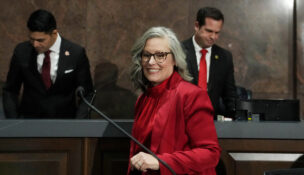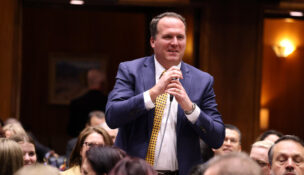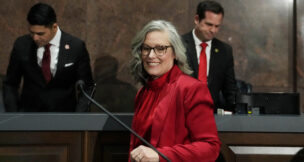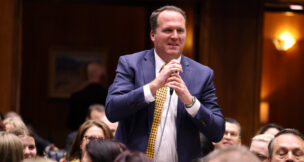GOP measures target local taxes and fees, school bonds, overrides
By Jamar Younger//February 14, 2025//
GOP measures target local taxes and fees, school bonds, overrides
By Jamar Younger//February 14, 2025//
Republican legislators have introduced a series of bills that would require a supermajority of voters or lawmakers to approve tax increases and fees for cities and towns, school districts and state agencies.
The proposed legislation would align current policies with laws that require a supermajority of the Legislature or voters to approve any tax increase at the state level.
Republicans and other supporters view the bills as a way to protect constituents from increased taxes and fees at the local level while promoting government efficiency. However, opponents say the bills interfere with local control and could make it harder for municipalities, school districts and agencies to increase funding for essential resources.
Sen. Shawnna Bolick, R-Phoenix, introduced a ballot referral that would require a school district bond and override election to receive approval from 60% of voters in order to pass. Bolick decided to introduce the measure after a voter asked her to run a bill that would bring school districts into alignment with the 2022 voter-approved Proposition 132, which requires a 60% voter approval for a tax increase.

“He asked for basically the same percentage to apply to the school board bond elections as we do with all their taxes that we have before the voters,” Bolick said.
The referral, SCR1028, was assigned to the Senate Education and Rules committees but hasn’t received a hearing yet.
However, a couple of education groups have already warned against the potential consequences of requiring a supermajority to pass a bond and override election.
“It puts the minority of the community in charge, because if a minority of the people vote against it, it doesn’t pass,” said Chuck Essigs, director of governmental relations for the Arizona Association of School Business Officials. “So basically, even if the majority of the citizens in a school district were in favor of the bond or in favor of the override, the override still could fail … because it’s really difficult to get a … super majority.”
The number of successful overrides would diminish and the lack of funding would affect student resources and teacher salaries, Essigs said.
“We don’t elect senators and representatives that way. We don’t require that a super majority vote for whoever gets elected in the community,” he said. “But why then require a super majority to decide which bonds and which overall elections are successful.”
The Arizona School Boards Association also spoke out against the bill, saying it could further hinder school districts that are already struggling financially.
According to a statement released by the organization: “These districts already face barriers in passing bonds and overrides due to smaller tax bases and lower voter turnout. A higher threshold would make it nearly impossible for them to secure funding. Without these funds, many schools will struggle to maintain buildings, update technology, and pay staff, negatively impacting students. School funding should remain a community decision. Raising the threshold strips control away from local voters.”
While Bolick’s measure awaits a committee hearing, two similar measures targeting municipalities and state agency fees are advancing through the Legislature.

Sen. J.D. Mesnard, R-Chandler, dropped a legislative referral that would amend Proposition 108, the measure voters approved in 1992 that requires a two-thirds majority approval in the Legislature for state tax and fee increases. Prop. 108 excluded most state agency fees from the two-thirds rule, allowing them to increase fees for certain programs through the traditional regulatory review process.
Mesnard said the referral, SCR1009, would prevent the Legislature from deferring fee assessments and increases to state agencies to circumvent the Legislature. The Senate Finance Committee approved the referral along party lines on Feb. 3.
“The current law is highly attractive to those who wish to game the system and impose fees that they know will not receive a supermajority vote from the legislature,” Mesnard said in a press release statement on Jan. 28. “This bill is a significant step towards protecting Arizona taxpayers from unchecked financial burdens while ensuring the legislature cannot shirk its sacred duty.”
Senate President Warren Petersen, R-Gilbert, introduced a bill, SB1013, that would require a two-thirds vote for cities, towns and counties to approve new taxes, fees and assessments. The bill was approved by the Senate along party lines on Feb. 3, and sent to the House.
Petersen said the legislation was introduced to curtail local governments that have raised taxes although those municipalities are “flushed with cash.”
“I’ve received a number of concerns and complaints from Arizonans who are frustrated with recent hikes on taxes and fees, especially in this era of inflation. We want government to be more efficient with taxpayer dollars, and this is a step in the right direction,” Petersen said in a statement released after the bill was approved. “This commonsense taxpayer protection requires the same threshold from local governments as the Legislature when raising or imposing fees.”
During the Senate Committee of the Whole on Jan. 29, Petersen said municipalities could still raise taxes but the increased threshold shouldn’t provide much of an obstacle to lawmakers who serve cities, towns and counties.
“It raises the bar from a simple majority to a two thirds vote, the same bar that we have here at the Legislature. It is much easier to pass things at the local level, the cities and the counties,” he said.
Sen. Mitzi Epstein, D-Tempe, criticized the bill as legislation that “stomps on freedom” and restricts local control for municipalities looking to serve their residents.
“It’s not your business what a city does with their budget,” she said. “That’s up to the people of that city and the people they elect to their city council.”














































